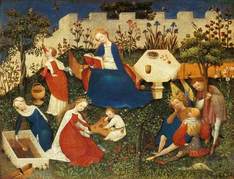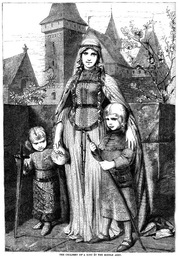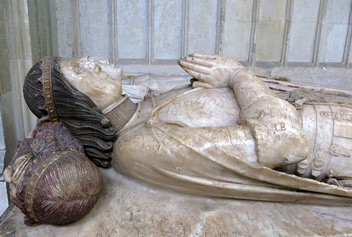wealth and status. As soon as they could pick up a sword, sons were dispatched to learn the art of war, and the female child, who was betrothed in the cradle was married as a teenager, often to someone who was old enough to be their father. I wonder, did these medieval parents show any emotion when they used them as pawns, when one child was out of the door, were they planning how best they would benefit from the next?
Does this mean that the medieval parent did not care for, or show love to, their children?
In the medieval world the infant mortality rate was high, a parent could lose their baby at birth, a child could die from an awful illnesses such as the plague, their grown up sons could face an early death in battle, their teenage daughters could die in childbirth, with all this, it is easy to see why these parents would have hearts of stone.
We should look no further than Margaret Beaufort for an example of a medieval parent. History tell us she was a devoted mother, she plotted and schemed and let nothing stand in the way of getting her beloved Henry on the throne of England.
What was her motivation, was it the promotion of the Lancastrian cause or was it just the love of her son ?
William de la Pole was an English commander and is remembered and blamed for the loss of French territories of Maine and Anjou, these lands formed part of the marriage contract of Henry VI to Margaret of Anjou that Pole had arranged. Pole was blamed for much, a scapegoat, who was exiled and murdered on route to Calais on the 2nd May 1450. Three days before, at the family home of Wingfield in Suffolk, William de la Pole prepared himself for exile, in doing so he wrote a heartfelt and moving letter to his eight year old son.
I beseech our Lord in Heaven, the Maker of all the World, to bless you, and to send you ever grace to love him,
and to dread him, to the which, as far as a father may charge his child, I both charge you, and pray you to set all your spirits and wits to do, and to know
his holy laws and commandments, by the which ye shall, with his great mercy, pass all the great tempests and troubles of this wretched world.
And that also, weetingly, ye do nothing for love nor dread of any earthly creature that should displease him. And there as any frailty maketh you to fall, beseech his mercy soon to call you to him again with repentance, satisfaction, and contrition of your heart, never more in will to offend him.
Secondly, next him above all earthly things, to be true liegeman in heart, in will, in thought, in deed, unto the king our aldermost high and dread sovereign
lord, to whom both ye and I be so much bound to; charging you as father can and may, rather to die than to be the contrary, or to know anything that were against the welfare or prosperity of his most royal person, but that as far as your body and life may stretch ye live and die to defend it, and to let his
highness have knowledge thereof in all the haste ye can.
Thirdly, in the same wise, I charge you, my dear son, alway as ye be bounden by the commandment of God to do, to love, to worship, your lady and mother; and also that ye obey alway her commandments, and to believe her counsels and advices in all your works, the which dread not but shall be best and
truest to you. And if any other body would steer you to the contrary, to flee the counsel in any wise, for ye shall find it naught and evil.
Furthermore, as far as father may and can, I charge you in any wise to flee the company and counsel of proud men, of covetous men, and of flattering
men, the more especially and mightily to withstand them, and not to draw nor to meddle with them, with all your might and power; and to draw to you
and to your company good and virtuous men, and such as be of good conversation, and of truth, and by them shall ye never be deceived nor repent you of.
Moreover, never follow your own wit in nowise, but in all your works, of such folks as I write of above, ask your advice and counsel, and doing thus, with
the mercy of God, ye shall do right well, and live in right much worship, and great heart’s rest and ease.
And I will be to you as good lord and father as my heart can think.
And last of all, as heartily and as lovingly as ever father blessed his child in earth, I give you the blessing of Our Lord and of me, which of his infinite
mercy increase you in all virtue and good living; and that your blood may by his grace from kindred to kindred multiply in this earth to his service, in
such wise as after the departing from this wretched world here, ye and they may glorify him eternally amongst his angels in heaven.
Written of mine hand,
The day of my departing fro this land.
Your true and loving father
I think the fact that William de la Pole sat down to write such a letter to his son is proof enough that they did.



 RSS Feed
RSS Feed
